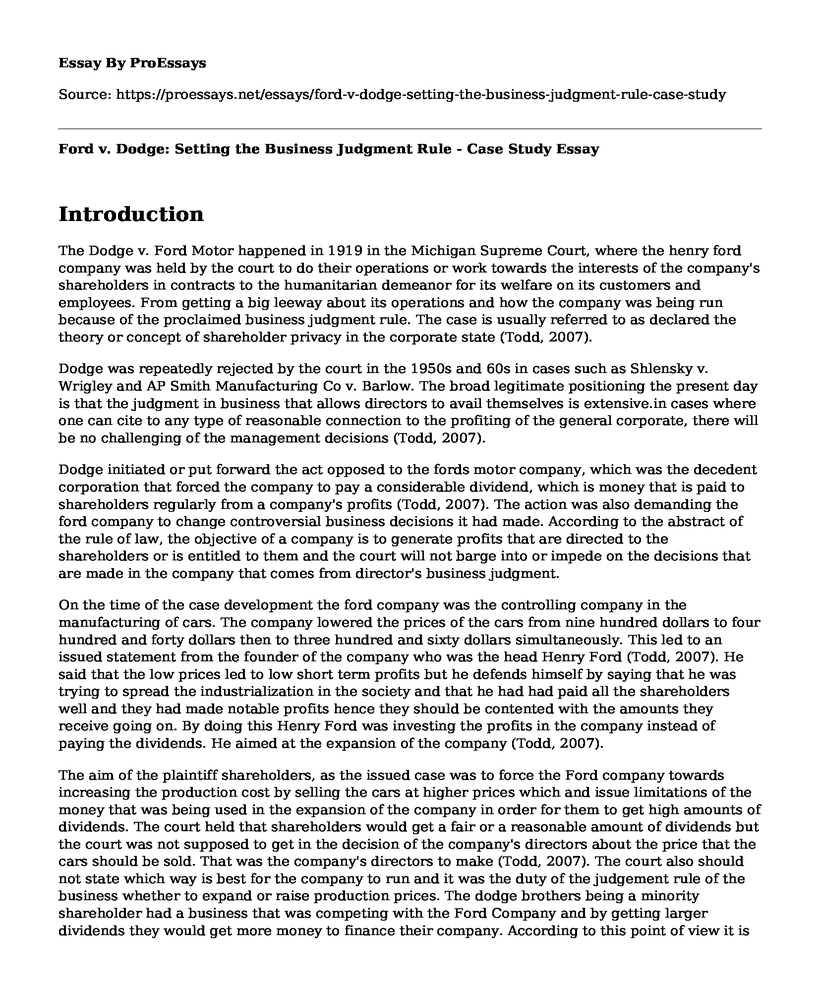Introduction
The Dodge v. Ford Motor happened in 1919 in the Michigan Supreme Court, where the henry ford company was held by the court to do their operations or work towards the interests of the company's shareholders in contracts to the humanitarian demeanor for its welfare on its customers and employees. From getting a big leeway about its operations and how the company was being run because of the proclaimed business judgment rule. The case is usually referred to as declared the theory or concept of shareholder privacy in the corporate state (Todd, 2007).
Dodge was repeatedly rejected by the court in the 1950s and 60s in cases such as Shlensky v. Wrigley and AP Smith Manufacturing Co v. Barlow. The broad legitimate positioning the present day is that the judgment in business that allows directors to avail themselves is extensive.in cases where one can cite to any type of reasonable connection to the profiting of the general corporate, there will be no challenging of the management decisions (Todd, 2007).
Dodge initiated or put forward the act opposed to the fords motor company, which was the decedent corporation that forced the company to pay a considerable dividend, which is money that is paid to shareholders regularly from a company's profits (Todd, 2007). The action was also demanding the ford company to change controversial business decisions it had made. According to the abstract of the rule of law, the objective of a company is to generate profits that are directed to the shareholders or is entitled to them and the court will not barge into or impede on the decisions that are made in the company that comes from director's business judgment.
On the time of the case development the ford company was the controlling company in the manufacturing of cars. The company lowered the prices of the cars from nine hundred dollars to four hundred and forty dollars then to three hundred and sixty dollars simultaneously. This led to an issued statement from the founder of the company who was the head Henry Ford (Todd, 2007). He said that the low prices led to low short term profits but he defends himself by saying that he was trying to spread the industrialization in the society and that he had had paid all the shareholders well and they had made notable profits hence they should be contented with the amounts they receive going on. By doing this Henry Ford was investing the profits in the company instead of paying the dividends. He aimed at the expansion of the company (Todd, 2007).
The aim of the plaintiff shareholders, as the issued case was to force the Ford company towards increasing the production cost by selling the cars at higher prices which and issue limitations of the money that was being used in the expansion of the company in order for them to get high amounts of dividends. The court held that shareholders would get a fair or a reasonable amount of dividends but the court was not supposed to get in the decision of the company's directors about the price that the cars should be sold. That was the company's directors to make (Todd, 2007). The court also should not state which way is best for the company to run and it was the duty of the judgement rule of the business whether to expand or raise production prices. The dodge brothers being a minority shareholder had a business that was competing with the Ford Company and by getting larger dividends they would get more money to finance their company. According to this point of view it is a great argument to state that ford had the best interest towards the company (Todd, 2007).
Work Cited
Henderson, M. Todd. "Everything old is new again: Lessons from Dodge v. Ford Motor Company." U of Chicago Law & Economics, Olin Working Paper 373 (2007).
Cite this page
Ford v. Dodge: Setting the Business Judgment Rule - Case Study. (2023, Mar 09). Retrieved from https://proessays.net/essays/ford-v-dodge-setting-the-business-judgment-rule-case-study
If you are the original author of this essay and no longer wish to have it published on the ProEssays website, please click below to request its removal:
- Court Standards
- Current Issues and Future Directions in Criminal Justice Essay
- Laws Relating to Abortion, the Death Penalty, and Assisted Dying Paper Example
- UCR, NIBRS & NCVS: Collecting US Crime Data - Essay Sample
- Essay Example on Marijuana Legalization: A Century-long Debate
- Essay Example on Death Penalty: Morality of Punishment in the US
- Jury Relying on Internet: A Growing Trend? - Essay Sample







